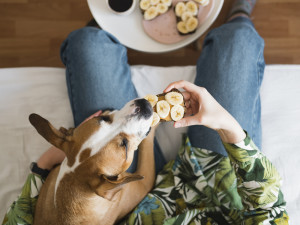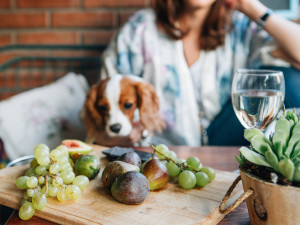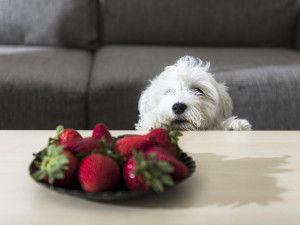Can Dogs Eat Peaches?
It’s the best fruit of the season, after all

Share Article
Dogs have been known to have some strange food preferences (some of them even try to eat socksopens in a new tab), but it’s easy to see why they may love peaches. They are sweet, juicy and you can really sink your teeth into them.
The good news is that yes, dogs can eat peaches – in moderation. Of course, as always, there are a few important considerations to keep in mind so read on to learn more about how to safely share peaches with your pup.

littleKin™ is Kinship’s home just for puppy and kitten parents. Bop over to check out expert advice, new pet tools, and special deals—all curated for your newest family member.
opens in a new tabNutrition facts about peaches for dogs
Peaches are known as stone fruits, or drupes, based on having one large seed in the centre surrounded by the fleshy part of the fruit. They grow on trees from the Prunus persica species and are typically only available seasonally. This is because many varieties need exposure to cold weather followed by warmth to stimulate fruit production.
There are many types of peaches available and the flesh of the fruit ranges from white to yellow with some being sweeter and better to eat fresh while others are better for baking.
Some sources even categorise peaches based on how easily the pit can be removed; with freestone varieties having an easily removable pit while clingstones are, well, clingy. Despite all the variety, the nutritional information for peaches is fairly consistent. Peaches are rich in fibre, natural sugars, vitamins, mineralsopens in a new tab and antioxidants, some of which are beneficial to our pups.
Are peaches good for dogs?
Peaches are not a necessary part of a dogs’ diet, however, they do provide some beneficial nutrients for dogs that make them good for an occasional small treat. This includes:
Fibre: peaches contain both soluble and insoluble fibre. These carbohydrates are not digestible but serve important functions in digestion. They help to bulk up the stool, prevent constipationopens in a new tab and provide important nutrients to the good microbes in the gutopens in a new tab
Vitamins and minerals: vitamin A, vitamin K, niacin and vitamin E are all found in peaches and are important for eye health, white blood cell production, healthy bones, blood clotting and more. Peaches also contain minerals such as potassium, manganese and copper, which are required for maintaining normal blood pressure, nerve function, muscle contractions and enzyme functions throughout the body.
Antioxidants: peaches are rich in antioxidants, especially two compounds called caffeic acid and carotenoids. These compounds help to protect DNA against damage from free radicals and may help to slow the ageing process, reduce inflammation and protect against certain kinds of cancersopens in a new tab.
Can dogs eat any part of a peach?
Technically, only the fruit of the peach is safe for dogs to eat as the rest of the plant is considered toxicopens in a new tab. This is due to compounds in the plant that contain cyanide. Cyanide is a toxin that can cause difficulty breathing, dilated pupils, seizures, coma or even death in large enough amounts.
Cyanide is present in the pit, leaves, stems and all parts of the plant, however, it needs to be ground up to be released, such as through chewing. Wilted leaves actually have more concentrated cyanide in them, so be careful if you have peach trees on your property. Most dogs will not ingest enough plant matter to get sick but it is best to be safe and keep them away from the trees.
Are peaches completely safe for dogs?
The fruit of the peach is safe for dogs to eat in moderation but there are a few important points to keep in mind:
Fibre content: because peaches are a high-fibre food, it’s important to offer only small amounts to your dog. Too much fibre can cause digestive upset including diarrhoeaopens in a new tab, gasopens in a new tab and bloating, especially if your dog is not used to it.
Sugar content: natural sugars give peaches their sweet delicious flavour but too much sugar isn’t good for dogs either. Excess sugar in their diet contributes unnecessary added calories which can put them at risk for weight gain opens in a new taband related health problems
Choking hazards: peach pits are especially risky for dogs as they can be choking hazardsopens in a new tab. They can also cause intestinal blockages if they are swallowed whole, requiring surgical removal. Be sure to remove the pits before sharing any peaches with your pup and offer bite-sized pieces that will be easy for your dog to chew and swallow.
Other ingredients: fresh peaches are fine for pups, but if they are part of a prepared dessert or other dish, be sure to check out the other ingredients and make sure there are no toxic foodsopens in a new tab on the list. Peaches are often prepared with syrup or other sweeteners, nuts, diary or high-fat ingredients, which can also make dogs sick, so it is best to stick to plain, fresh peaches whenever possible.
The bottom line: can dogs eat human food?
Dogs can eat lots of human foods and you can certainly share many snacks with your dog with a little bit of research and planning. It is important to make sure that the foods you plan to share are safe and healthy for dogs and that they don’t contain any toxic or unhealthy ingredientsopens in a new tab that could make your pup sick. And while it is never easy to turn down your pup’s requests for a bite, especially when they give you the sad puppy eyes and whines, it is very important to set limits, too.
Dogs need to get the bulk of their diet from a complete and balanced dog food to ensure they are getting all of the nutrients they need to stay healthy. If your pup is filling up on too many snacksopens in a new tab, they may not eat their dog food.
Or, if your dog is eating both their regular portion of dog food plus lots of treats and table foods, they may be unintentionally overfed, leading to weight gain. As a good rule of thumb, treats should be limited to less than ten percent of your dog’s total intake. This ensures they mostly eat their dog food and maintain their healthy, adorable figures.
Other foods that are safe for dogs
Blueberries are safe in moderation and provide important nutrients.
Apples are a healthy choiceopens in a new tab for a crunchy, satisfying snack.
Eggs are high in proteinopens in a new tab and can be shared with your pup, too.
Other foods that are dangerous
Rib bones and other cooked bones are dangerous for dogs and should not be shared.
Chocolate and these other toxic foodsopens in a new tab are off-limits, too.
Avocadoopens in a new tab contains persin, which can be toxic to dogs, causing vomiting and diarrhoea.
Frequently asked questions
How many peaches can a dog eat?
Dogs can eat small amounts of the fruit but too much can cause digestive upset.
Is it OK to give dogs peaches?
The fruit of the peach is safe for dogs to eat in moderation.
Why do dogs like peaches?
Dogs may like the sweet taste as well as the juicy, soft texture.
Can dogs eat any part of the peach?
Only the flesh of the fruit is safe for dogs; the pits and the rest of the plant contain toxic compounds.
References:

Dr. Amy Fox, DVM
Amy Fox, DVM is a small animal veterinarian in New York City. A lifelong animal lover, Dr. Fox studied biology in college and then worked as a veterinary nurse before pursuing veterinary school at Cornell University. She has worked in many different settings including shelter medicine, emergency medicine, general practice, and animal cruelty and forensics. She is especially interested in nutrition, preventative medicine and care for senior pets. Dr. Fox also enjoys writing about veterinary medicine and teaching. In her free time she loves to cook, garden, and go for long runs.
Related articles
- opens in a new tab
Can Dogs Eat Pineapple?
Whip out the Hawaiian shirt, pineapple is a go for dogs
- opens in a new tab
Can Your Dog Eat Watermelon?
Yep, you can share watermelon with your pup – but there are a few safety tips to keep in mind
- opens in a new tab
Can My Dog Eat Bananas?
Yep – bananas are a healthy and delicious treat for your pup
- opens in a new tab
Can Dogs Eat Grapes?
The answer is no, no, no and here’s why
- opens in a new tab
Can Dogs Eat Strawberries?
In moderation, strawberries are a tasty, healthy treat for your pup






